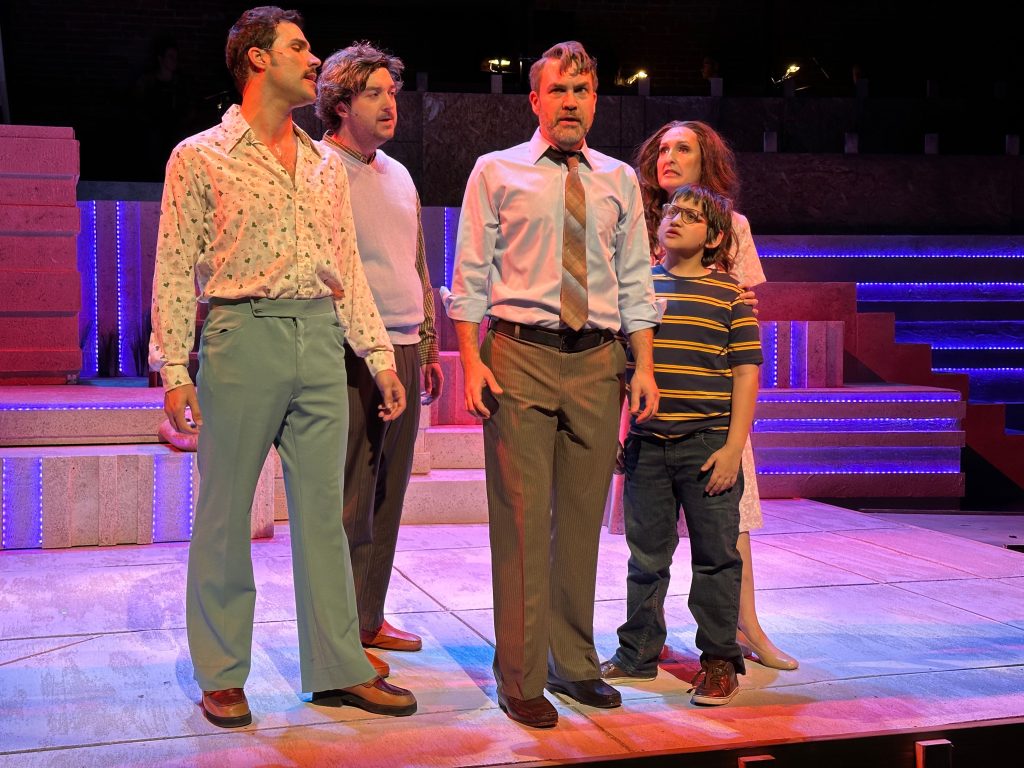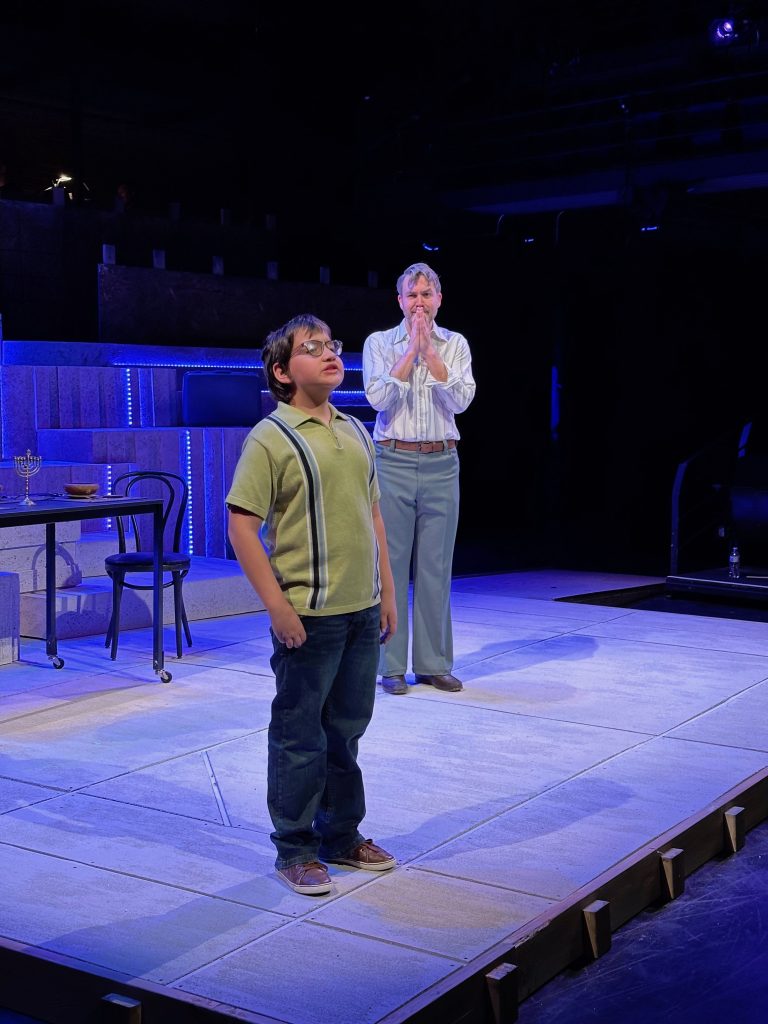It’s True Talent that Gives Front Porch’s ‘Falsettos’ Its Perfect Pitch
- Like
- Digg
- Del
- Tumblr
- VKontakte
- Buffer
- Love This
- Odnoklassniki
- Meneame
- Blogger
- Amazon
- Yahoo Mail
- Gmail
- AOL
- Newsvine
- HackerNews
- Evernote
- MySpace
- Mail.ru
- Viadeo
- Line
- Comments
- Yummly
- SMS
- Viber
- Telegram
- Subscribe
- Skype
- Facebook Messenger
- Kakao
- LiveJournal
- Yammer
- Edgar
- Fintel
- Mix
- Instapaper
- Copy Link

A tight family of exceptional talent: Sal Bucci, Justin Boark, Chad Elder, Matthew Frontz, and Jenna Kantor command center stage.
Falsettos first premiered on Broadway in 1992. With a book by William Finn and James Lapine, and music and lyrics by Finn, the musical really began in 1981 as a one-act, (then as a trilogy of one-acts), and later edited, with the help of Lapine, to become the hit that earned seven Tony nominations and won two of those for Best Book and Best Original Score. In 2016, Falsettos was revived with stars Andrew Rannells, Stephanie J. Block, and (Pittsburgh’s own) Christian Borle. That stellar cast has nothing on this current production.
Even after 42 years, the plot is more than compelling, the theme is wonderfully relevant, the music and lyrics are refreshingly clever, (one song after the next,) and the book is terse, tight, and tragic. But if there is yet a better reason to see Front Porch Theatricals’ Falsettos at the New Hazlett Theater, it is its amazingly talented cast. There is not a false note in this Falsettos.
Like a Tight Family, Falsetttos is Funny and Fearless
But before heaping praise on all seven actors in this “no kidding, must see” production, the characters they play inform all of the fun on stage. Marvin (Chad Elder) is a married man, husband to Trina (Jenna Kantor) and father of Jason (Matthew Frontz,) who visits his gay lover, Whizzer (Sal Bucci) with as much frequency as he does his psychiatrist, Mendel (Justin Borak.) Jason, just ten years old, is worried he may become gay, while Trina, well aware of her husband’s “progressive” life, bemoans a world run by immature men. Marvin suggests that Trina should see his shrink, and, surprise, Mendel falls instantly in love with Trina. And then Marvin and Whizzer have a significant fight, while Jason avoids any human interaction other than playing chess (against himself!) When the boy is commanded to see a psychiatrist, it’s only Whizzer who convinces him to do so, and it becomes no secret to Jason that Mendel is in love with his mother. Trina and Mendel marry, and as Whizzer leaves his lover’s shared apartment, Marvin realizes he has made a mess of everything. All he ever wanted was a tight family.

Whizzer (Bucci) and Marvin (Elder) torture themselves in a tango of deceit and despair.
Act Two, two years later. Jason is soon to celebrate his bar mitzvah. Marvin and Trina bicker over the planning. Stepdad Mendel does little to help Jason. Marvin’s next-door gay neighbors, Cordelia (Lindsay Bayer,) a caterer, and Dr. Charlotte (Natalie Hatcher,) enter the scene. And, as if the five adults of this now “tight family” need more trouble, Whizzer re-appears. The scene is one of the funniest (of many) in the play, showing that, apparently, Jewish boys are no better at playing baseball than all the other “games” adults play. And those games commence forthwith, albeit with great despair, tragedy and jolting truths.

The entire cast cheers on a seemingly hopeless career in the great American pastime: baseball and “bitching.” (Front, Kantor, Borak, Bayer, Hatcher, Bucci, and Elder.)
Fantastic Fun; Extraordinary Talent
As Jason, Matthew Frontz delivers surprising stage presence, a keen pitch and difficult harmonies. The kid does not miss a beat. As his father, Marvin, Chad Elder carries the heavy load as instigator of all the plot’s intrigue. To do that he must perform and sing as a man with self-doubts, serious regrets, and yet self-deceiving determination. Elder can lay it on thick or spread it tenderly. His astounding voice carries both in equal measure. Likewise, Sal Bucci as Whizzer must temper his character’s strong drive with the empathy only a self-confident adult might have for any child. His program “bio” relates that Bucci retired from the stage eight years ago. That may be true, but talent like his doesn’t show up without many more years of steady, professional training. And Justin Borak, as Mendel, plays his role as psychiatrist with vulnerability, charm, and self-deprecation. His is a remarkable voice that has the range to be both aggressive and comforting.

Trina (Kantor) makes clear it’s not just the chopped salad that’s “Breaking Down.”
And then there’s Jenna Kantor, the proud mother, the weary wife, the sound of reason with all the fragile dissonance of insecurity. The audience knows straight off Kantor has amazing command of her stage, but just wait a few numbers for her “I’m Breaking Down” and she owns it. Even with such amazing vocal competition (but who’s keeping score?) Kantor wins the night with “Trina’s Song,” perhaps the show’s most memorable, if not insightful, tune.
Last, but not least, when Act Two introduces the audience to two new gay neighbors, expectations may be that these actors need not be as polished as the rest. Oh, no! Lindsay Bayer and Natalie Hatcher deliver humor, harmony and healing like few others. It is a shame the audience must wait out the first act to hear them.
Talent like this doesn’t arrive at opening night without inordinate direction, accomplished musical accompaniment or laudable staging. Rob James directs the show with the baton of an orchestra conductor. Every beat of it plays as if this musical were an opera; there are no “words,” just songs to sing. And, as such, the action must move apace purposefully. James allows the action and the actors to soar. But, Deana Muro as Music Director must get equal credit for the joyous heights of the night. This is not a show of toe-tapping melodies; these are all character-driven songs of hope and fear composed for the discerning ear. (By the way, Muro is on the keyboard the entire night.) And it’s all set on a fantastic stage stacked with (building?) blocks, designed by JohnMichael Bohach. Ashley Harmon’s choreography is risqué and rewarding. Not to be overlooked––the audience certainly cannot––the many costumes and costume changes are splendid and swiftly made. Michelle Nowakowski, take a bow! Andrew David Ostrowski deserves distinct credit for lighting design; his work can be admired not just from the rafters or spotlight projections, but in the stage itself, defining a baseball diamond or racquetball court. He manages, too, to craft a very acceptable “slap” with a simple lightning flash.

It’s no small reward that a son (Frontz) forgives his true father (Elder.)
As if this production needs more praise––surely many packed houses will deliver that––Bruce Smith and Nancy Zionts, co-producers, deserve Pittsburgh’s appreciation for delivering musical theater that is rarely staged in any city of our size. Some of New York or London’s best shows just can’t be revived on smaller city stages because of cast size, orchestral demands, or available talent. Front Porch Theatricals defies those concerns, delivering some of the best work audiences have seen on any stage in Pittsburgh. Falsettos is the real deal; excellent music sung by remarkable talent, weaving together a compelling story that’s both hilarious and tear-jerking.
Offstage Credit
Further credit is deserving. Brady Patsy is Production Manager, Liam B. Nute is Stage Manager and Sarah Schuck is Hair and Makeup Director. Unless the audience (or cast) should have worried about flying bananas on opening night (thanks, Alexis Retcofsky for Props,) nothing went awry. Which meant that the show’s three understudies stayed in the wings. A show this tight must give thanks to them, too: Dan Mayhak, Anna Gergerich and Liv Poole.
Falsettos plays through May 28 at the New Hazlett Theater, 6 Allegheny Square East, Allegheny Center, Northside.
For tickets, including student and group discounts, visit the Front Porch website.
Photos: Martha Smith
C. Prentiss Orr writes about theater for Entertainment Central. He has worked in theater management and has also taught theater. His latest book, The Surveyor and the Silversmith, is a history of white settlement, genocide, and land speculation in Western Pennsylvania.
Share on Social Media
- Like
- Digg
- Del
- Tumblr
- VKontakte
- Buffer
- Love This
- Odnoklassniki
- Meneame
- Blogger
- Amazon
- Yahoo Mail
- Gmail
- AOL
- Newsvine
- HackerNews
- Evernote
- MySpace
- Mail.ru
- Viadeo
- Line
- Comments
- Yummly
- SMS
- Viber
- Telegram
- Subscribe
- Skype
- Facebook Messenger
- Kakao
- LiveJournal
- Yammer
- Edgar
- Fintel
- Mix
- Instapaper
- Copy Link
Follow Entertainment Central
Sign up for the EC Newsletter
Latest Stories







